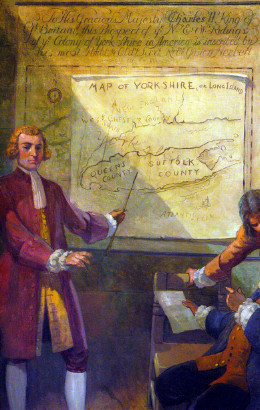History
About Andrew Cusack
 Writer, web designer, etc.; born in New York; educated in Argentina, Scotland, and South Africa; now based in London.
Writer, web designer, etc.; born in New York; educated in Argentina, Scotland, and South Africa; now based in London. read more
News
Blogs
Reviews & Periodicals
Arts & Design
World
France
Mitteleuropa
Knickerbockers
Argentina
The Levant
Africa
Cape of Good Hope
Netherlands
Scandinavia
Québec
India
Muscovy
Germany
Academica
Visit of King Peter
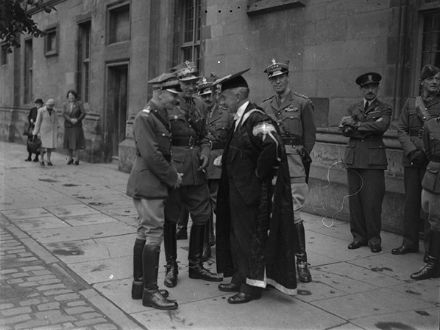
King Peter of Yugoslavia visits the University of St Andrews, September 1941. Above, on South Street outside Parliament Hall and St. Mary’s College gate. Below, in St. Mary’s quad.
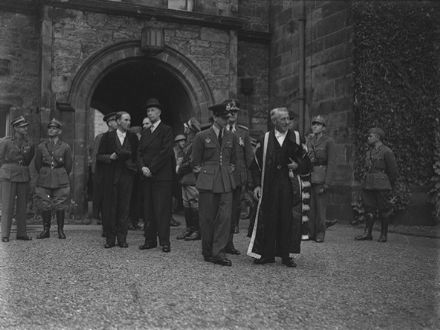
The Eastchester Covenant
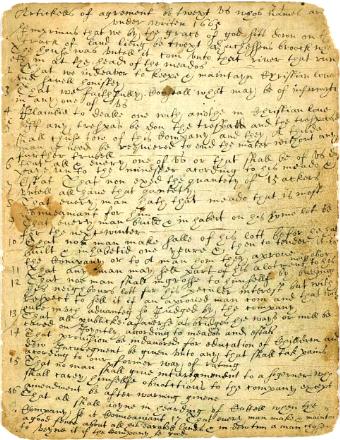
The Town of Eastchester, New York was settled in 1664 and in the following year the English inhabitants thereof drew up a covenant binding all the townsfolk. Among the various articles within this foundational tract are sensible pronouncements guaranteeing the rights of private property, forbidding trespassing, and a promise to “indeavor to keepe & maintayn Christian love and sivell honesty”.
My favorite part, however, is article 15, stating that “no man shall entertain obnoxious foreigners”.
More Wilsonian Piffle Brought to Light
A very interesting article entitled ‘Two of the Famous Stories About Woodrow Wilson — And They’re Not True‘ by Thomas Fleming. An excerpt:
The chairman of the committee, Senator Thomas S. Martin of Virginia, was also the Senate Democratic majority leader. Martin scowled at Pierce and asked him to explain how the army was going to spend this stupendous sum, the equivalent of perhaps $50 billion in today’s dollars.
Pierce began listing how much it cost to build training camps, buy rifles, artillery, airplanes — then added nervously: “And we may have to have an army in France.”
“Good Lord!” Senator Martin said. “You’re not going to send soldiers over there, are you?”
Few comments better exemplify the almost incredible naivete that underlay the American decision to declare war on Germany.
The Two Germanies
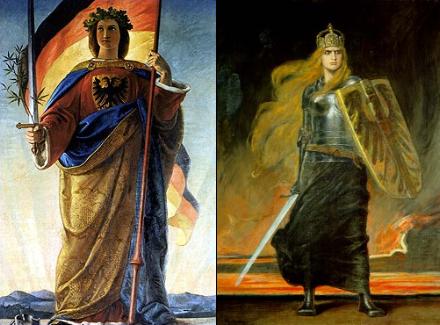
A recent post by Aelianus entitled The Two Germanies brought to mind a little-known idea which surfaced towards the end of World War II. I read in the biography of Empress Zita that a plan was hatched to divide what we now know as Germany, combining Bavaria and Austria to create a Catholic state under the restored Hapsburgs and leaving northern Germany to be a Protestant kingdom with, odd as it might perhaps seem, Lord Louis Mountbatten. Of course it’s not really that odd when one considers that the real name of the Mountbatten family is Battenberg, changed to disguise their Teutonicity during the Great War when the fervor of hatred against our cousin the Hun ran willy-nilly. While Mountbatten was born in Windosr Castle and served as First Sea Lord as well as the final Viceroy of India, he was really entirely German in terms of ancestry. His parents were Prince Louis of Battenberg and Princess Victoria of Hesse and the Rhine, while Louis IV, Grand Duke of Hesse and the Rhine was his grandfather. By right, he was His Serene Highness Prince Louis of Battenberg, but cherishing their adopted country, the family were intimidated into dropping all German styles and titles in 1917.
Lord Mountbatten apparently took the proposal seriously enough that he began to brush up on his German, and informed Empress Zita, living in exile in the Dominion of Canada during the Second World War, of its prospects for both their families. Of course, with Yalta, nothing was ever to come of it and the closest Lord Mountbatten ever came to power, aside from his reign as Viceroy of India, was in 1967 when he was alledgedly asked to lead a coup overthrowing the Labour government. Mountbatten was highly reluctant, and nothing came of the plot. In 1979, while summering at his usual holiday home in the Irish Republic, Mountbatten was killed by an IRA bomb, along with the Dowager Lady Brabourne (aged 82), the Hon. Nicholas Knatchbull (aged 14), and Paul Maxwell (aged 15), a local boy working on the Mountbatten’s boat. He was a Knight of the Garter, a Knight Grand Cross of Bath, Order of Merit, Knight Grand Cross of the Star of India, Knight Grand Cross of the Indian Empire, Knight Grand Cross of the Royal Victorian Order, and the Distinguished Service Order.
A Journey to Mells
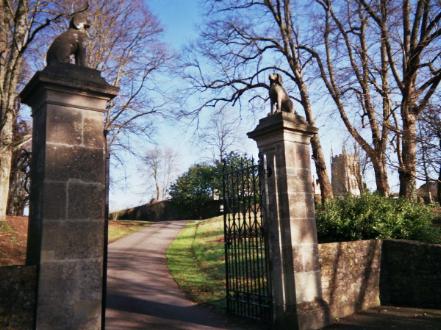
A good number of we happy St Andreans were down in the West Country recently — Somerset to be precise — for the wedding of two of our dear and closest friends [to be covered in a later post]. Being in Somerset, Alec, “Ishmael”, Clare and my good self decided to hop over to the little village of Mells last Friday to see the grave of Msgr. Ronald Knox and to sup at what is known as one of the best pubs in all of England. (more…)
Sir John Cowperthwaite
St Andrean Responsible for Hong Kong’s ‘Economic Miracle’
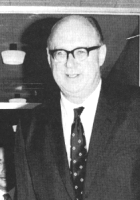 Sir John Cowperthwaite was the main figure responsible for Hong Kong’s economic transformation, lifting millions of people out of poverty. While scholars like Milton Friedman and F. A. Hayek put an intellectual case for the free markets, it was Cowperthwaite who provided the textbook example showing economically liberal policies leading to swift economic development. His practical example provided confidence to the Thatcher and Reagan governments, and was a key influence in China’s post-Mao economic liberalisation.
Sir John Cowperthwaite was the main figure responsible for Hong Kong’s economic transformation, lifting millions of people out of poverty. While scholars like Milton Friedman and F. A. Hayek put an intellectual case for the free markets, it was Cowperthwaite who provided the textbook example showing economically liberal policies leading to swift economic development. His practical example provided confidence to the Thatcher and Reagan governments, and was a key influence in China’s post-Mao economic liberalisation.
Cowperthwaite read classics at St Andrews and Christ’s College, Cambridge. While waiting to be called up by the Cameronians (Scottish Rifles), he went back to St Andrews to study economics. This Scottish education imbibed him with the ideas of the Enlightenment, especially the work of Adam Smith, who had been born nearby in Kirkcaldy. He was a liberal in the 19th century sense, believing that countries should open up to trade unilaterally. In 1941, he joined the Colonial Administrative Service in Hong Kong. When it fell to the Japanese, he was seconded to Sierra Leone as a district officer, before returning in 1946 to help the colony’s economic recovery. “Upon arrival,” the Far Eastern Economic Review put it, “he found it recovering quite nicely without him.” He quickly worked his way up the ranks and was made Financial Secretary in 1961, in charge of its economic policy for a decade.
When he became Financial Secretary, the average Hong Kong resident earned about a quarter of someone living in Britain. By the early 90s, average incomes were higher than Britain’s. Cowperthwaite made Hong Kong the most economically free economy in the world and pursued free trade, refusing to make its citizens buy expensive locally-produced goods if they could import cheaper products from elsewhere. Income tax was never more than a flat rate of fifteen percent. The colony’s lack of natural resources, apart from a harbour, and the fact that it was a food importer, made its success all the more interesting. Cowperthwaite’s policies soon soon attracted the attention of economists like Milton Friedman, whose television series Free to Choose featured Hong Kong’s economic progress in some detail.
Asked what is the key thing poor countries should do, Cowperthwaite once remarked: “They should abolish the Office of National Statistics”. In Hong Kong, he refused to collect all but the most superficial statistics, believing that statistics were dangerous: they would led the state to to fiddle about remedying perceived ills, simultaneously hindering the ability of the market economy to work. This caused consternation in Whitehall: a delegation of civil servants were sent to Hong Kong to find out why employment statistics were not being collected; Cowperthwaite literally sent them home on the next plane back.
Cowperthwaite’s frugality with taxpayers’ money extended to himself. He was offered funds from the Hong Kong Executive to do a much needed upgrade to his official residence, but refused pointing out that since others in Hong Kong did not receive that sort of benefit, he did not see why he should.
Cowperthwaite’s hands off approach, and rejection of the in vogue economic theory, meant he was in daily battle against Whitehall and Westminster. The British government insisted on higher income tax in Singapore; when they told Hong Kong to do the same, Cowperthwaite refused. He was an opponent of giving special benefits to business: when a group of businessmen asked him to provide funds for tunnel across Hong Kong harbour, he argued that if it made economic sense, the private sector would come in and pay for it. It was built privately. His economic instincts were revealed in his first speech as Financial Secretary: “In the long run, the aggregate of decisions of individual businessmen, exercising individual judgment in a free economy, even if often mistaken, is less likely to do harm than the centralised decisions of a government, and certainly the harm is likely to be counteracted faster.”
His ability to pursue policies which, at the time, were deeply unfashionable, was helped by having supportive Hong Kong Governors, Sir Robert Black and Sir David Trench, who both had free market sympathies. Moreover, Cowperthwaite was formidable at arguing his case: as Dennis Healey recalled: “I always retired hurt from my encounters with the redoubtable Financial Secretary.”
From 1972 to 1981, Cowperthwaite was an advisor to Jardine Flemming & Co in Hong Kong. He retired to St Andrews with his wife Sheila and was an active member of the Royal & Ancient. For many years, he spent six months of the year with his wife traveling the world visiting friends and relatives. He was an old school civil servant and, much to the frustration of economists, resisted requests to write an autobiography about his time in Hong Kong, believing that his duty was to serve, not to reveal the minutiae of government business.
– John James Cowperthwaite KBE OBE CMG, Financial Secretary of Hong Kong, born 25 April 1915; died 21 January 2006.
New York in the Early Republic
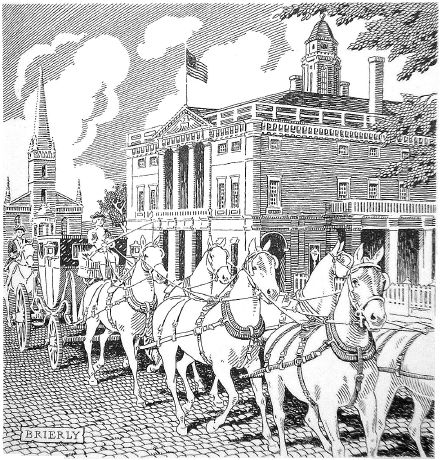
IT IS NOT OFTEN remembered that New York was the first capital of the United States and, as such, was home to the executive, legislative, and judicial branches of the new republic, albeit only for a short time. Federal Hall (above, with the Presidential carriage) was originally constructed in 1699 as a City Hall for New York. It was in this building at 26 Wall Street in 1735 that John Peter Zenger was tried and acquitted of libeling the Governor, affirming the Freedom of the Press. The Continental Congress began meeting in the City Hall in the 1780’s, and with the ratification of the new Constitution of the United States it became the first home of the federal government. Having been elected the first President of the United States, General George Washington was inaugurated on the balcony of the building on April 30, 1789. (more…)
The Restitution of Romanian Castles
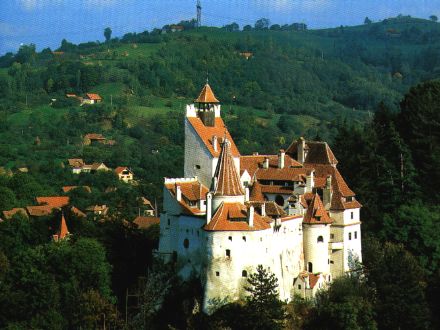
The castle of Bran (above), and the castles of Peles (below), and Pelisor (bottom) are to be restituted by the Romanian government to the Habsburgs and the Hohenzollern-Sigmaringens respectively, and then purchased back by the government for over $60 million, according to Adrian Iorgulescu, the Romanian Minister of Culture. The castles were illegitimately seized by the Communist authorities after they took power in 1947, and after buying them back the government will keep the castles as museums.
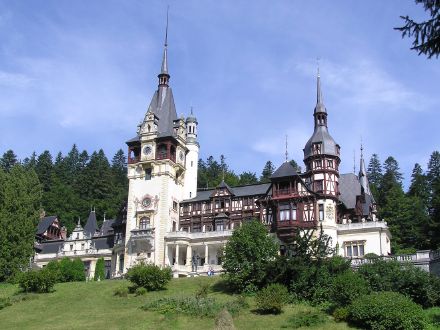
The Habsurgs are the Imperial Family of Austria as well as being the Royal Family of Hungary, Bohemia, Dalmatia, Croatia, Slavonia, Galicia, Lodomeria, Illyria, and Jerusalem, and the Ducal Family of Tuscany, Krakow, Lorraine, Salzburg, Styria, Carinthia, Carniola, the Bukovina, Transylvania, Upper Silesia, Lower Silesia, Modena, Parma, Piacenza, Guastalla, Auschwitz, Zator, Teschen, Friuli, Ragusa, and Zara. The Hohenzollern-Sigmaringen family, on the other hand, are a cadet branch of the senior Swabian branch of the Hohenzollerns, and are the Royal Family of Romania, which has been a republic since the Communist takeover in 1947 and has since, sadly, failed to restore its monarchy. Unlike the more reknowned Hohenzollerns of Brandenburg, the Romanian Royal Family are not Protestant.
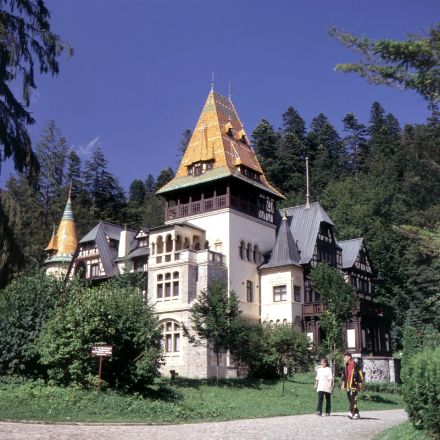
UPDATE: A reader corrects: “The Hohenzollern-Sigmaringens are not the cadet branch, but in fact the surviving senior branch, which position they inherited upon the extinction in the male line of the true senior line, the Hohenzollern-Hechingens, in 1869. Historically they are of minor importance in comparison to their apostate cousins, but still a storied family. Schloss Sigmaringen, by the way, is a magnificent seat, romantically restored in the 19th century. They own it still, but do not tend to live within its forbidding walls. I was shown round it once in dead of winter: an unforgettable experience.”
The Last Will and Testament of Louis XVI
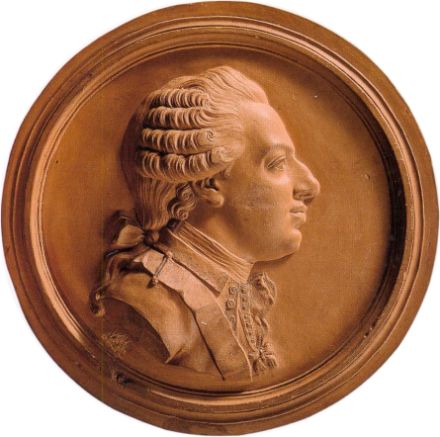
January 21 marked the anniversary of the regicide of Louis XVI, King of France, by the revolutionary authorities.
Here is his last will and testament, written a month previous on Christmas Day.
In the name of the Very holy Trinity, Father, Son and Holy Ghost.
To-day, the 25th day of December, 1792, I, Louis XVI King of France, being for more than four months imprisoned with my family in the tower of the Temple at Paris, by those who were my subjects, and deprived of all communication whatsoever, even with my family, since the eleventh instant; moreover, involved in a trial the end of which it is impossible to foresee, on account of the passions of men, and for which one can find neither pretext nor means in any existing law, and having no other witnesses, for my thoughts than God to whom I can address myself, I hereby declare, in His presence, my last wishes and feelings.
I leave my soul to God, my creator; I pray Him to receive it in His mercy, not to judge it according to its merits but according to those of Our Lord Jesus Christ who has offered Himself as a sacrifice to God His Father for us other men, no matter how hardened, and for me first.
I die in communion with our Holy Mother, the Catholic, Apostolic, Roman Church, which holds authority by an uninterrupted succession, from St. Peter, to whom Jesus Christ entrusted it; I believe firmly and I confess all that is contained in the creed and the commandments of God and the Church, the sacraments and the mysteries, those which the Catholic Church teaches and has always taught. I never pretend to set myself up as a judge of the various way of expounding the dogma which rend the church of Jesus Christ, but I agree and will always agree, if God grant me life the decisions which the ecclesiastical superiors of the Holy Catholic Church give and will always give, in conformity with the disciplines which the Church has followed since Jesus Christ.
I pity with all my heart our brothers who may be in error but I do not claim to judge them, and I do not love them less in Christ, as our Christian charity teaches us, and I pray to God to pardon all my sins. I have sought scrupulously to know them, to detest them and to humiliate myself in His presence. Not being able to obtain the ministration of a Catholic priest, I pray God to receive the confession which I feel in having put my name (although this was against my will) to acts which might be contrary to the discipline and the belief of the Catholic church, to which I have always remained sincerely attached. I pray God to receive my firm resolution, if He grants me life, to have the ministrations of a Catholic priest, as soon as I can, in order to confess my sins and to receive the sacrament of penance.
I beg all those whom I might have offended inadvertently (for I do not recall having knowingly offended any one), or those whom I may have given bad examples or scandals, to pardon the evil which they believe I could have done them.
I beseech those who have the kindness to join their prayers to mine, to obtain pardon from God for my sins.
I pardon with all my heart those who made themselves my enemies, without my have given them any cause, and I pray God to pardon them, as well as those who, through false or misunderstood zeal, did me much harm.
I commend to God my wife and my children, my sister, my aunts, my brothers, and all those who are attached to me by ties of blood or by whatever other means. I pray God particularly to cast eyes of compassion upon my wife, my children, and my sister, who suffered with me for so long a time, to sustain them with His mercy if they shall lose me, and as long as they remain in his mortal world.
I commend my children to my wife; I have never doubted her maternal tenderness for them. I enjoin her above all to make them good Christians and honest individuals; to make them view the grandeurs of this world (if they are condemned to experience them) as very dangerous and transient goods, and turn their attention towards the one solid and enduring glory, eternity. I beseech my sister to kindly continue her tenderness for my children and to take the place of a mother, should they have the misfortune of losing theirs.
I beg my wife to forgive all the pain which she suffered for me, and the sorrows which I may have caused her in the course of our union; and she may feel sure that I hold nothing against her, if she has anything with which to reproach herself.
I most warmly enjoin my children that, after what they owe to God, which should come first, they should remain forever united among themselves, submissive and obedient to their mother, and grateful for all the care and trouble which she has taken with them, as well as in memory of me. I beg them to regard my sister as their second mother.
I exhort my son, should he have the misfortune of becoming king, to remember he owes himself wholly to the happiness of his fellow citizens; that he should forget all hates and all grudges, particularly those connected with the misfortunes and sorrows which I am experiencing; that he can make the people happy only by ruling according to laws: but at the same time to remember that a king cannot make himself respected and do the good that is in his heart unless he has the necessary authority, and that otherwise, being tangled up in his activities and not inspiring respect, he is more harmful than useful.
I exhort my son to care for all the persons who are attached to me, as much as his circumstances will allow, to remember that it is a sacred debt which I have contracted towards the children and relatives of those who have perished for me and also those who are wretched for my sake. I know that there are many persons, among those who were near me, who did not conduct themselves towards me as they should have and who have even shown ingratitude, but I pardon them (often in moments of trouble and turmoil one is not master of oneself), and I beg my son that, if he finds an occasion, he should think only of their misfortunes.
I should have wanted here to show my gratitude to those who have given me a true and disinterested affection; if, on the one hand, I was keenly hurt by the ingratitude and disloyalty of those to whom I have always shown kindness, as well as to their relatives and friends, on the other hand I have had the consolation of seeing the affection and voluntary interest which many persons have shown me. I beg them to receive my thanks.
In the situation in which matters still are, I fear to compromise them if I should speak more explicitly, but I especially enjoin my son to seek occasion to recognize them.
I should, nevertheless, consider it a calumny on the nation if I did not openly recommend to my son MM. De Chamilly and Hue, whose genuine attachment for me led them to imprison themselves with me in this sad abode. I also recommend Clery, for whose attentiveness I have nothing but praise ever since he has been with me. Since it is he who has remained with me until the end, I beg the gentlemen of the commune to hand over to him my clothes, my books, my watch, my purse, and all other small effects which have been deposited with the council of the commune.
I pardon again very readily those who guard me, the ill treatment and the vexations which they thought it necessary to impose upon me. I found a few sensitive and compassionate souls among them – may they in their hearts enjoy the tranquillity which their way of thinking gives them.
I beg MM. De Malesherbes, Tronchet and De Seze to receive all my thanks and the expressions of my feelings for all the cares and troubles they took for me.
I finish by declaring before God, and ready to appear before Him, that I do not reproach myself with any of the crimes with which I am charged.
Made in duplicate in the Tower of the Temple, the 25th of December 1792.
LOUIS
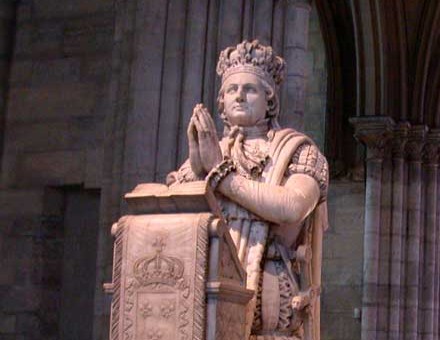
The 7th Regiment in Washington Square
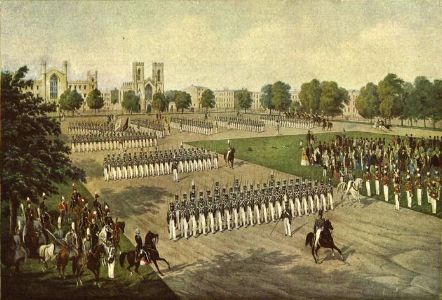
Entitled “National Guard – 7th Regiment New York State Militia”, this mid-nineteenth century view shows the famous 7th Regiment of New York, nicknamed the Silk-Stocking Regiment, parading in Washington Square. In the background can be seen the University of the City of New York and the Church of St. Thomas, which has since moved to Fifth Avenue in Midtown.
Thomas Dongan, 2nd Earl of Limerick
AS VIRGINIA, a year short of four centuries since her foundation, has only recently inaugurated her first Catholic governor, it might be an appropriate time to remember the first Catholic governor of New York, Thomas Dongan (right). Dongan’s tenure as Governor of the Province of New York was one of the most important in the history of our land, and witnessed the formative period of responsible government in what would eventually become the Empire State.
Thomas was born in 1634, the youngest son of Sir James Dongan, Bt., a Member of the Irish Parliament. After the regicide of Good King Charles in 1649, the Catholic family feared persecution and fled to France, as did the Royal Family. In France, having Gallicized his surname to D’Unguent, Thomas joined an Irish regiment and fought under the Vicomte de Turenne (who himself, born into Calvinism, became a Catholic in October 1668). Despite the Restoration of the Crown in Britain and Ireland, Dongan remained in France, being promoted to colonel in his fortieth year. The 1678 Treaty of Nijmegen, however, required all of Charles II’s subjects in the service of France to return home, and so Thomas obliged. Through the efforts of James, Duke of York, with whom Dongan had the privilege of serving in the French Army, he was granted a pension, a high-ranking commission, and was appointed Lieutenant-Governor of Tangiers, of all places, which (along with Bombay) had been given to England as part of the dowry of Catherine of Braganza.
It was in 1682 that James, Duke of York, as Lord Proprietor of New York, appointed Thomas Dongan to govern the bankrupt colony. “In this office,” the Catholic Encyclopedia says, “Dongan proved himself an able lawgiver, and left an indelible mark on political and constitutional history.” He convened the first representative assembly of the Province in 1683, which enacted the Charter of Liberties enunciating the form of government in New York. The Duke of York’s supreme legislative power as Lord Proprietor would reside in a governor, council, and general assembly. Members of the assembly were conferred rights and privileges making their august legislature coequal to and independent of Parliament. Courts of justice were established, liberty of conscience regarding religion was declared, and the principle of no taxation without representation was affirmed. Dongan signed the Charter of Liberties on 30 October 1683, and solemnly proclaimed it the next day at the Stadt Huys, New York’s city hall.
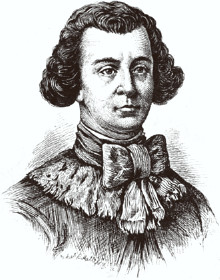 “Thus to Dongan’s term as governor,” quoth the Encyclopedia, “can be dated the Magna Charta of American constitutional liberties, for his system of government became the programme of continuous political agitation by the colonists of New York Province during the eighteenth century. It developed naturally into the present state government, and many of its principles passed into the framework of the Federal Government. Moreover, a rare tribute to his genius, the government imposed by him on New York Province, 1683, was adopted by England after the American War of Independence as the framework of her colonial policy, and constitutes the present [1909] form of government in Canada, Australia, and the Transvaal.”
“Thus to Dongan’s term as governor,” quoth the Encyclopedia, “can be dated the Magna Charta of American constitutional liberties, for his system of government became the programme of continuous political agitation by the colonists of New York Province during the eighteenth century. It developed naturally into the present state government, and many of its principles passed into the framework of the Federal Government. Moreover, a rare tribute to his genius, the government imposed by him on New York Province, 1683, was adopted by England after the American War of Independence as the framework of her colonial policy, and constitutes the present [1909] form of government in Canada, Australia, and the Transvaal.”
The peace and harmony of the Province was furthered in 1684 when Dongan, in the presence of Lord Howard, the Governor of Virginia, received the voluntary submission of the Iroquois confederacy to “the Great Sachem Charles”. The following year saw the death of Charles II and the ascent of the Lord Proprietor, James, Duke of York, to the thrones of England, Scotland, and Ireland. In that year of 1685, Dongan established a Post Office to strengthen communications within his colony and between all the English colonies in America. In the next year, 1686, the Governor granted civic charters to New York and Albany. Dongan’s charter for the City of New York lasted 135 years, while that of Albany was only replaced in 1870. Avid historians would have been bemused/irritated by Archdiocese’s celebration just a few years ago of the two-hundredth anniversary of Catholic education in New York. This would be because New York’s first Catholic school was not in the 1800’s during the republic’s early years but in the 1680’s when Governor Dongan established a college (in the secondary sense) under the guidance of three Jesuit priests, one of whom was his own private chaplain.
Despite the brief attempt to merge New York and New England, followed by the overthrow of James, our last Catholic king, in the so-called ‘Glorious Revolution’, Governor Dongan’s legacy in establishing the institutions of responsible government in New York remains. Indeed he was unquestionably New York’s greatest governor until the advent of ‘Magnus Apollo’ himself, DeWitt Clinton, in the nineteenth century. With the new Protestant Williamite administration in charge, Thomas Dongan returned to England in 1691 and, with the death of his elder brother, inherited the Earldom of Limerick under its first (1686) creation. He died in 1715, poor and childless. Nonetheless, as the Encyclopedia notes:
The tribute of history to his personal charm, his integrity, and character, is outspoken and universal. His public papers give evidence of a keen mind and a sense of humour. He was a man of courage, tact, and capacity, an able diplomat, and a statesman of prudence and remarkable foresight. In spite of the brief term of five years as Governor of New York Province, by virtue of the magnitude, of the enduring and far-reaching character of his achievements, he stands forth as one of the greatest constructive statesmen ever sent out by England for the government of any of her American colonial possessions.
The World of Law
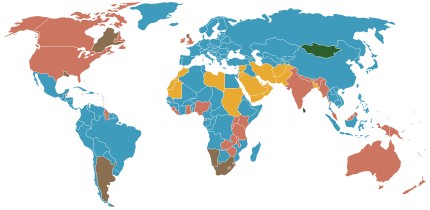

Today I stumbled upon this nifty little map (slightly modified) on Wikipedia showing the different legal systems of the world. (Click on the map above for the full version). Civil law is predominant, but of course Common Law is the best, and happens to predominate throughout the English-speaking world. Four economists have also claimed that economic prosperity and the common law system are linked. As one can see from the map, Scotland does not share the same legal system as the rest of the United Kingdom but instead has its own unique system of law, the maintenance of which was stipulated in the 1707 Treaty of Union uniting Scotland and England.
The Wikipedia article on Common law has a paragraph on New York law, which interestingly states:
To be specific, the patroon system ended along with the later manorial courts originating from the British period when New York abolished these psuedo-feudal law features in 1849. Scarsdale, the neighboring municipality to the north of here, is supposedly the last manor granted in the British Empire and recently celebrated the three-hundredth anniversary of the 1703 grant. There were a number of other manors granted in New York, such as Fordham and Pelham nearby. The City of New Rochelle consists of land purchased by the Huguenots from Thomas Pell. One of the stipulations was that New Rochelle would present Pell and his successors with a fatted calf every year on St. John’s Day (if my memory serves me correctly). I understand the practice was continued into the 20th century before sadly lapsing.
Meanwhile, some Europeans are catching on to the fact that the Supreme Court of the United States has usurped legislative powers contrary to the Constitution. The Chancellor of Austria and Prime Minister of Denmark are worried that the European Court of Justice might be tempted to do the same, and Paul Belien offers his thoughts at the Brussels Journal.
Old Dominion, New Mace
THE HOUSE OF DELEGATES OF THE COMMONWEALTH OF VIRGINIA
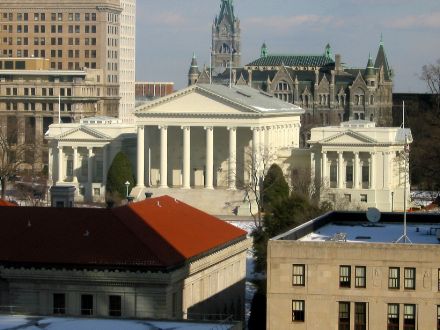
VIRGINIA IS THE birthplace of Anglo-America, and as such it has managed to maintain higher standards of propriety than most other places in the States, including its long-time rival, New England. Governors, for example, still wear morning dress for their inaugurations rather than the lamentable business suit which has usurped events even so high and mighty as the inauguration of the President of the United States. (Carter abolished morning dress for the inauguration, Reagan wore it  for his first with a stroller instead of tailcoat, but since then it’s been suits all around). Roger Scruton, Britain’s greatest living Conservative thinker, recently moved with his family to Virginia to enjoy the fruits of American freedom since one of his favorite pasttimes, outlawed back in the Mother Country, thrives in his new home. The origin of Virginia’s traditional nickname, ‘the Old Dominion’, is from King Charles II who granted the Colony that title of Dominion as a recognition of its steadfast loyalty to the Crown during the trying days of the Interregnum.
for his first with a stroller instead of tailcoat, but since then it’s been suits all around). Roger Scruton, Britain’s greatest living Conservative thinker, recently moved with his family to Virginia to enjoy the fruits of American freedom since one of his favorite pasttimes, outlawed back in the Mother Country, thrives in his new home. The origin of Virginia’s traditional nickname, ‘the Old Dominion’, is from King Charles II who granted the Colony that title of Dominion as a recognition of its steadfast loyalty to the Crown during the trying days of the Interregnum.
Some traditions, however, have been mournfully discontinued. Virginia’s House of Burgesses was the first legislative body in the New World but its name was changed to the House of Delegates during the Revolution. (North Carolina, meanwhile, kept its House of Commons until it was defeated by the United States in the Civil War). Nonetheless, the House sat in the antiphonal pattern akin to the British and Commonwealth parliaments until 1904 when it adopted the dastardly French republican semicircular seating plan. To my knowledge, it was the last American legislature (outside of Canada, of course) to arrange its seating in the traditional way. (more…)
Bully!
Governors Island
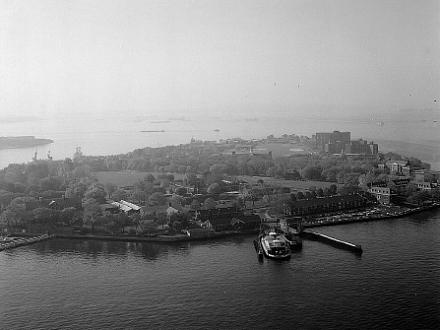
GOVERNORS ISLAND IS one of New York’s hidden gems. Not only is it a place which has a long and storied history, but it remains, however underappreciated, a place of great beauty, not to mention a place of great potential. The fact that this island in New York Harbor has been the property of the government for the preponderance of its existence has shielded it from the destructive forces of commerce which have savaged so much of what is beautiful and historic in the remainder of the city.
Let us explore this intriguing isle… (more…)
Bill and Ted
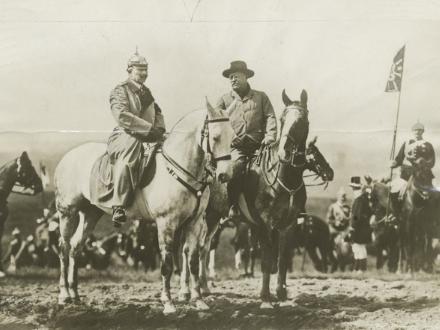
His Imperial Majesty Wilhelm II, the German Emperor, and His Excellency Mr. Theodore Roosevelt, President of the United States of America.
Old Guardsmen
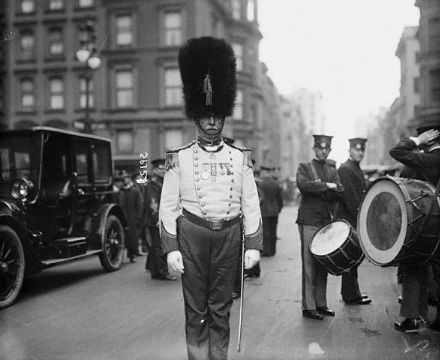
Ardolph Loges Kline, one of my grandfather’s predecessors as Commander of the Old Guard of the City of New York, on the 89th Anniversary of the Old Guard, April 22, 1915. Kline was the acting Mayor of New York who started the annual tradition of lighting the Christmas Tree in City Hall Park (or ‘holiday tree’ as it is now officially called). This ceremony has since been eclipsed in popularity by the Rockefeller Center tree lighting, but still takes place every year.
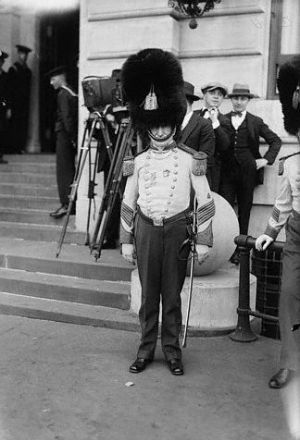
Here we have C.H. Heustis on his 85th birthday in 1922. Heustis served in General Burnside’s brigade during the Civil War, later becoming a broker on Wall Street. He never missed a single meeting or parade of the Old Guard once he joined.
From the Bettmann archive.
Previously: The Old Guard | Grandpa
Happy Trafalgar Day!

Twas on this day two centuries ago that the Royal Navy under Lord Nelson gave the combined French and Spanish fleet a right good whalloping, thus ensuring that freedom and responsible constitutional government would flourish and spread for two centuries afterward.
So today we raise a glass to Lord Nelson, and spit on the name Bonaparte! (And Hitler, and Stalin, and Brussels, and any such nastiness the continent dare throw against the English-speaking peoples of the world!).
Arose from out the azure main;
This was the charter of the land,
And guardian angels sang this strain:
Rule, Britannia!
Britannia, rule the waves;
Britons never shall be slaves.
The nations not so blest as thee,
Shall in their turns to tyrants fall;
While thou shalt flourish great and free,
The dread and envy of them all.
Rule, Britannia!
Britannia, rule the waves;
Britons never shall be slaves.
Still mor majestic shalt thou rise,
More dreadful from each foreign stroke;
As the loud blast that tears the skies,
Serves but to root thy native oak.
Rule, Britannia!
Britannia, rule the waves;
Britons never shall be slaves.
Thee haughty tyrants ne’er shall tame,
All their attempts to bend thee down;
Will but arouse thy generous flame,
But work their woe, and thy renown.
Rule, Britannia!
Britannia, rule the waves;
Britons never shall be slaves.
To thee belongs the rural reign,
They cities shall with commerce shine;
All thine shall be the subject main,
And every shore it circles thine.
Rule, Britannia!
Britannia, rule the waves;
Britons never shall be slaves.
The Muses, still with freedom found,
Shall to thy happy coast repair;
Blest Isle! With matchless beauty crowned,
And manly hearts to guide the fair.
Rule, Britannia!
Britannia, rule the waves;
Britons never shall be slaves.
The Old Guard
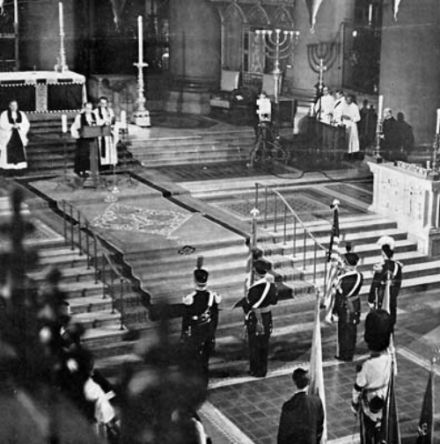
The above photograph shows a 1963 service in the Cathedral of St. John the Divine, New York. Closest to the sanctuary are four members of the Veteran Corps of Artillery, State of New York, but behind them can be scene a member of the Old Guard of the City of New York. The VCA, of which my Uncle Matt (a frequent commenter upon this site) is a member, is older, being founded in 1790. The Old Guard dates from 1826, and Uncle Matt’s father (my grandpa) was Commadant of that august group. There’s a great photo of my father as a small child gazing up at his father in Old Guard uniform including the tall bearskin busby. Perhaps Pop will scan it sometime, else I will get around to it when I’m back in the States.
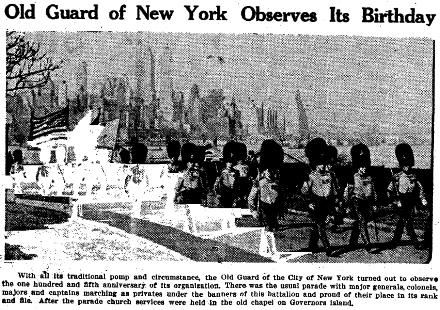
With all its traditional pomp and circumstance, the Old Guard of the City of New York turned out to observe the one hundred and fifth anniversary of its organization. There was the usual parade with major generals, colonels, majors, and captains marching as privates under the banners of this battalion and proud of their place in its rank and file. After the parade church services were held in the old chapel on Governors Island.
(A bad copy from The Sun, Fort Covington, NY, 1931)
Remembering Gemayel

September 14 is the twenty-third anniversary of the assasination of the Catholic general and politician Bachir Gemayel by Syrian agents, only nine days before he was to be inaugurated as President of Lebanon. Gemayel was the son of Pierre Gemayel, the founder of the Lebanese Kataeb (Phalange) which Bachir eventually led himself, and was also instrumental in unifying the Christian militias of the country into the Lebanese Forces, which joined with the conventional Lebanese Armed Forces in their 100-day attempt to expel the Syrians from Lebanon in 1978.
A massive bomb exploded in the Kataeb headquarters on September 14, 1982, killing the President-elect and twenty-four other souls. The assasination only further escalated the violence of the Civil War, a conflict which was taken to regretable extremes by all the parties invovled. (more…)
Search
Instagram: @andcusack
Click here for my Instagram photos.Most Recent Posts
- Amsterdam November 26, 2024
- Silver Jubilee November 21, 2024
- Articles of Note: 11 November 2024 November 11, 2024
- Why do you read? November 5, 2024
- India November 4, 2024
Most Recent Comments
- on The Catholic Apostolic Church, Edinburgh
- on Articles of Note: 11 November 2024
- on Articles of Note: 11 November 2024
- on Why do you read?
- on Why do you read?
- on University Nicknames in South Africa
- on The Situation at St Andrews
- on An Aldermanian Skyscraper
- on Equality
- on Rough Notes of Kinderhook
Book Wishlist
Monthly Archives
Categories

